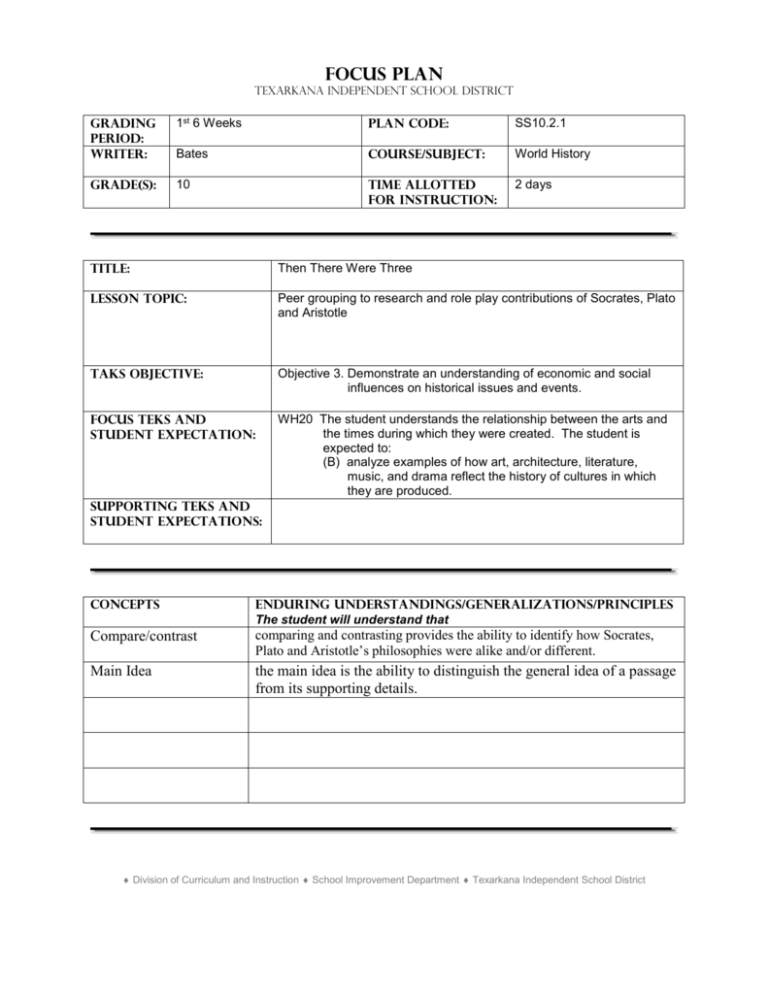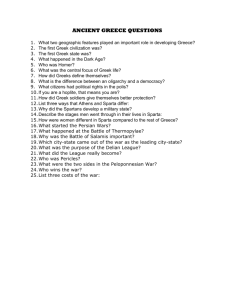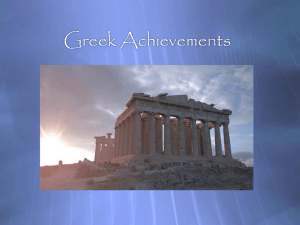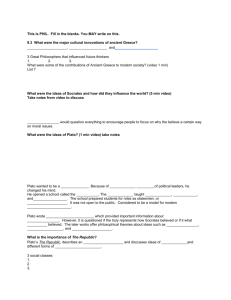WH20B Then There Were Three - Lesson 7.doc
advertisement

Focus Plan Texarkana Independent School District GRADING PERIOD: writer: 1st 6 Weeks PLAN CODE: SS10.2.1 Bates Course/subject: World History Grade(s): 10 Time allotted for instruction: 2 days Title: Then There Were Three Lesson TOPIC: Peer grouping to research and role play contributions of Socrates, Plato and Aristotle TAKS Objective: Objective 3. Demonstrate an understanding of economic and social influences on historical issues and events. FoCUS TEKS and Student Expectation: WH20 The student understands the relationship between the arts and the times during which they were created. The student is expected to: (B) analyze examples of how art, architecture, literature, music, and drama reflect the history of cultures in which they are produced. Supporting TEKS and Student Expectations: Concepts Enduring Understandings/Generalizations/Principles The student will understand that Compare/contrast comparing and contrasting provides the ability to identify how Socrates, Plato and Aristotle’s philosophies were alike and/or different. Main Idea the main idea is the ability to distinguish the general idea of a passage from its supporting details. Division of Curriculum and Instruction School Improvement Department Texarkana Independent School District I. Sequence of Activities (Instructional Strategies) A. Focus/connections/anticipatory set The teacher will use an overhead projector to display: TAKS Daily Practice Transparency 5.4 (The Glory that was Greece). The teacher will instruct students to write only the correct answer for question 1. The student will write the question and answer for question 2. They are to be recorded in the students’ History Facts of the Day spiral notebook as number 16 and 17 respectively. B. Instructional activities (demonstrations, lectures, examples, hands-on experiences, role play, active learning experience, art, music, modeling, discussion, reading, listening, viewing, etc.) 1. Objective: Peer groups will research the philosophies shared by Socrates, Plato and Aristotle then prepare a skit of their respective philosopher for class presentation. 2. Procedures: The teacher will play Prentice Hall Listening to Music CD #6: Greek Music. 3. Modeling: The teacher will state: “This CD introduced the two most important patterns of notes in ancient Greek music played on a modern harp. The sound of the harp is similar to the sound of a kithara, the foremost instrument of ancient Greece.” The teacher will remind students that music is one element of a society’s culture. (review meaning of culture: way of life of a society that is handed down from one generation to the next by learning and experience) According to some historians, Greek achievements in the arts represented the height of human development in the western world. One poet referred to it as “the glory that was Greece”. Today we will focus on another element of culture – more specifically the philosophies of three Greek thinkers: Socrates, Plato and Aristotle. C. Guided activity or strategy The teacher will divide the class into three sections: Section 1 will research Socrates, Section 2 will research Plato and Section 3 will research Aristotle. The research will include: a brief biography at least one major accomplishment of the individual significance of the individual D. Accommodations/modifications E. Enrichment Division of Curriculum and Instruction School Improvement Department Texarkana Independent School District II. iii. STUDENT PERFORMANCE A. Description Students will use Handout 1 as a guideline. B. Accommodations/modifications C. Enrichment Assessment of Activities A. Description B. Rubrics/grading criteria See Handout 2 for the grading criteria. C. Accommodations/modifications D. Enrichment E. Sample discussion questions 1. What two things did the Greek thinkers or philosophers use to find causes of what happened? (reason and observation) 2. Is logic still used today to solve problems? Why or why not? 3. How did the Athenians use rhetoric? (to advance their careers) 4. What significance did the Greek philosophers’ achievements play in Greek history? (They set standards for future generations.) IV. TAKS Preparation A. Transition to TAKS context The teacher will identify comparing and contrasting as skills needed to identify how different ideas and historical figures are alike and/or different. In researching the three individuals: Socrates, Plato and Aristotle, students will discover their likenesses and their differences. One likeness is their nationality. They were all born in Greece. One difference is two of them wrote books and one wrote no books. The teacher will state, “Another critical thinking skill is identifying the main idea.” The student is able to distinguish the general idea of a passage from its supporting details. B. Sample TAKS questions The teacher will use an overhead projector to display: TAKS Daily Practice 5.4 The Glory That Was Greece. Question 1. TAKS 8.30(F), WH25(C) – Comparing and Contrasting Question 2. TAKS WH25(C) Finding the Main Idea Division of Curriculum and Instruction School Improvement Department Texarkana Independent School District V. Key Vocabulary logic, rhetoric, philosophers VI. VII. Resources A. Textbook (World History Connections To Today) pages 115-119 B. Supplementary materials Listening to Music CD (World History Connections To Today) Handout 1: Peer Biography Research Procedure Handout 2: Greek Philosopher Biography Rubric TAKS Daily Transparencies (World History Connections To Today) Prentice Hall Presentation Pro C. Technology CD player Computer Overhead projector follow up activities (reteaching, cross-curricular support, technology activities, next lesson in sequence, etc.) Students will present skits to the class the following day. To conclude the lesson, the teacher will insert Presentation Pro CD into a computer, Select Lesson #5 and present the slide show (1-4) as a review of Chapter 5 – Ancient Greece. Item #5 will be the topic of next week’s lessons on Alexander and the Hellenistic Age. VIII. Teacher Notes The teacher will preview the music CD and the slide show CD prior to class. The teacher will also preview the color transparency to be used as the History Facts of the Day. Division of Curriculum and Instruction School Improvement Department Texarkana Independent School District








